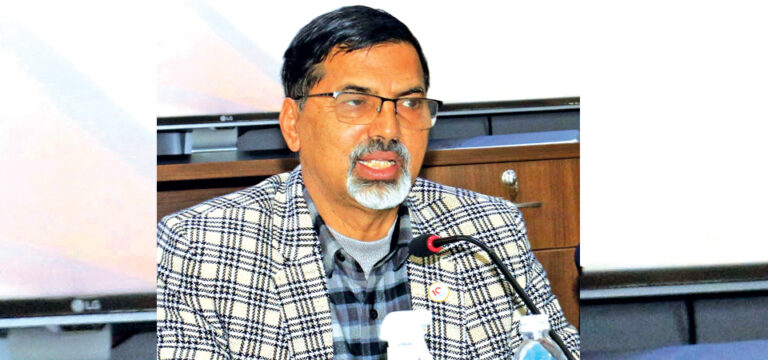
Finance Minister Janardan Sharma has said that the country’s economy is not in crisis.
Addressing the 26th anniversary of Society of Economic Journalists-Nepal on Thursday, he urged experts and stakeholders not to call the current situation a crisis, citing that the indicators of the economy are in a state of improvement and now the construction will speed up and capital expenditure will also increase.
Minister Sharma said, “Since the economy is facing various pressures and challenges rather than a crisis, let’s think and discuss solutions now, let’s say what the current situation is, let’s not spread false propaganda.”
Stating that now the revenue collection has decreased and the consumption has also decreased, he said that demand would increase following the expedition of development works.
The private sector, which contributes 70 per cent to the country’s economy and employment, should not be underestimated, he said and assured that the government would address their demands and problems.
“The country’s economy has progressed in a traditional way,” Sharma said, “Now let’s look for new dimensions, let’s use the latest technology in the economic sectors such as water, electricity and information technology.” On the occasion, Governor of Nepal Rastra Bank Maha Prasad Adhikari said that the world economy and countries with developed economies are now under stress.
“Nepal’s situation is not that bad,” he said, “Compared to other countries in South Asia (except India), Nepal’s economy is stable, although it is not without some difficulties.”
The country lost foreign exchange worth Rs. 2.34 billion in a period of a year due to external reasons for the first time in its 55-year history.
He made it clear that even though there is opposition from the private sector in working capital guidance,
Nepal Rastra Bank has brought the policy after sufficient discussions and suggestions.
He, however, said that the central bank is always ready for discussions to find solutions to problems.
Nepali Congress General Secretary Gagan Kumar Thapa said that the coming leadership should have courage to drive the country smoothly.
“Considering that we are in an unprecedented crisis, the problem will be solved only if we work with determination,” he said.
Thapa said that it is necessary to increase the government’s participation in health and public education, and emphasised that access to development and industry should be increased.
He said that there is a competition on how to bring the old-age allowance up to what age and opined that it is necessary to focus on how much production to increase.
“It is important for the future prime minister to understand the seriousness of the current situation,” he said.
Former Finance Minister and vice-chairman of CPN-UML Bishnu Prasad Paudel said that that there is no possibility to form a stable government even with this people’ mandate.
He said that if no solid solution is found through cooperation between the government-private sector-cooperatives, the time will be spent in blaming.
“The current economic situation is not normal,” he said, “An extraordinary situation cannot be solved only by common practice.”
President of Federation of Nepalese Chambers of Commerce and Industry Shekhar Golchha said that no leader who is willing to cooperate with the private sector is seen.
He said that the current problem is not only in the private sector but in the country as a whole.
President of Nepal Chamber of Commerce Rajendra Malla emphasised that even though political issues are different, the government should have the same opinion and uniformity in economic issues.
Vishnu Kumar Agarwal, president of Confederation of Nepalese Industries, asked to prioritise economic issues. He said that even now, investors are facing problems due to misunderstanding and lack of cooperation between ministries. On the occasion, President of Nepal Bankers Association Anil Upadhyay
said that the current economy is challenging.
“Achieving economic growth or economic stability?” he asked, “The government should also work to make investable funds for the long term.”
On the occasion, SEJON unveiled annual journal Artha Niti (Economic Policy).
Source : TRN,






